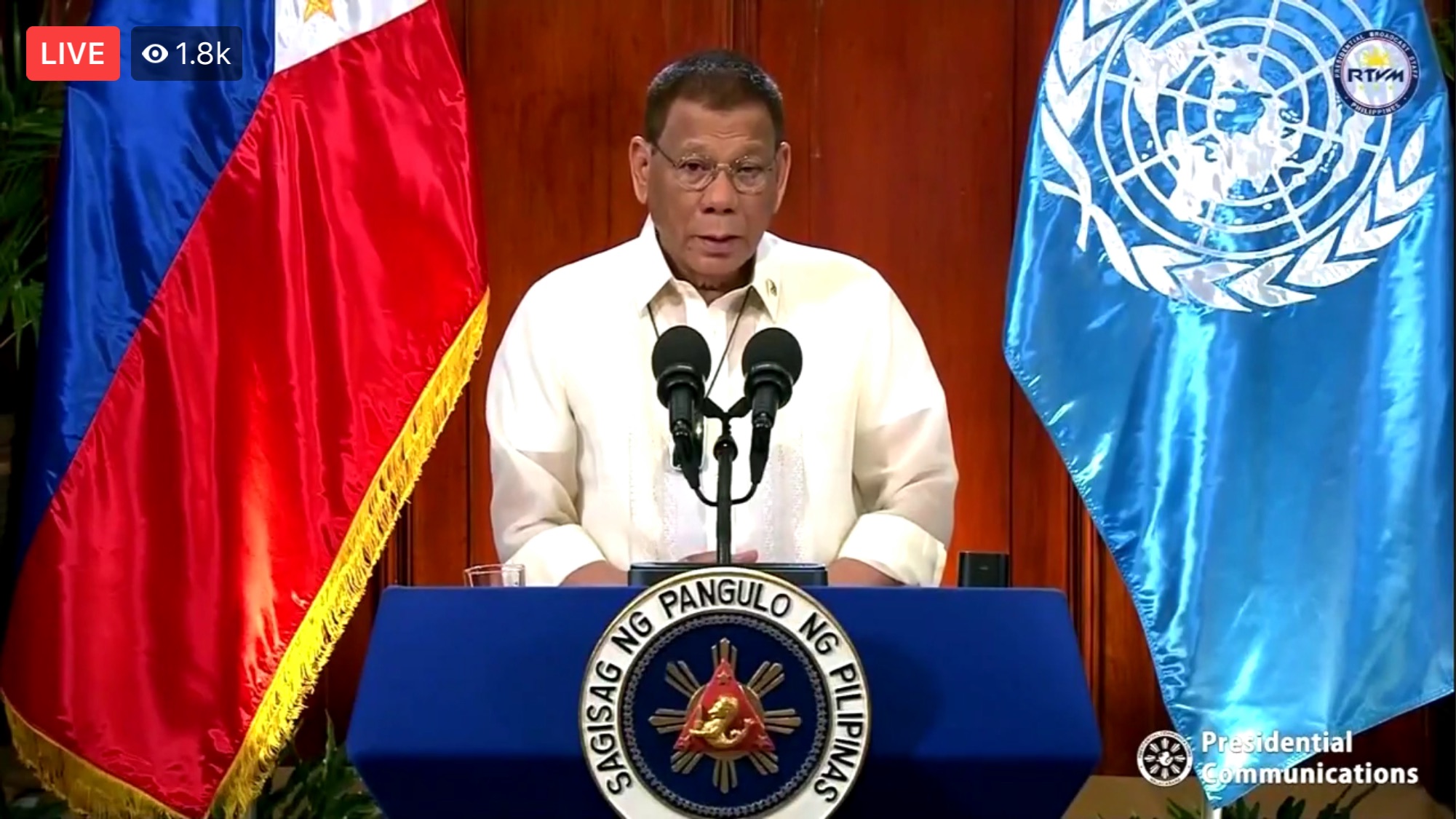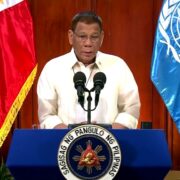
PHILIPPINE President Rodrigo Duterte on Wednesday, September 23, addressed the United Nations General Assembly (UNGA) for the first time since assuming office in 2016.
“I am honored to address you today on behalf of the Filipino people on the 75th anniversary of the United Nations. The invisible enemy that is COVID-19 has brought about an unfamiliar global landscape and unleashed a crisis without precedent. It is the biggest test the world and the United Nations faced since World War II,” Duterte said.
The president said that how the world will address COVID-19 will define our future.
“For the Philippines, this means putting up all of the peoples of our united nations at the core of this response,” he said.
Duterte encouraged each nation to put up a united front against the pandemic, saying the world needs are coordinated international plans and efforts to pursue a common purpose.
“COVID-19 knows no border. It knows no nationality. It knows no race. It knows no gender. It knows no age. It knows no creed,” Duterte stressed.
The president urged that when the world finds the vaccine, access to it must be available to al rich and poor nations alike.
In need of stability
Duterte encouraged all countries to ease geopolitical tensions that continue to rise, saying that it heightens fears and tends to tear peoples apart.
“Given the size and military might of the contenders, we can only imagine and be aghast at the terrible toll on human life and property that shall be inflicted if the ‘word war’ deteriorates into a real war of nuclear weapons and missiles,” the president explained as he called on stakeholders in the South China Sea, the Korean Peninsula, the Middle East and Africa.
Unexpected turn
As Duterte continued to push for unity among nations in addressing the pandemic, he affirmed the Philippines’ commitment in the South China Sea in accordance with the UNCLOS and the 2016 Arbitral Award.
“The Award is now part of international law, beyond compromise and beyond the reach of passing governments to dilute, diminish or abandon,” Duterte maintained.
Duterte said he rejects any attempt to undermine it. He also thanked countries and states who have acknowledged the award and what if stands for.
China has consistently invalidated the 2016 ruling and continued with its reclamation activities and militarization in the heavily contested area.
Filipinos coming home
The president shared that many migrant Filipino workers have been devastated by the pandemic.
“Many have lost not only their livelihood, but also their health and lives as well. Yet they go on in the frontlines, healing, caring for others in different parts of the world,” Duterte said.
The Philippine government has embarked on an unprecedented repatriation program with more than 345,000 overseas Filipino workers who need to come home.
“We have brought back half and are bringing back the rest,” Duterte said.
Climate change
Filipinos and citizens of other developing countries suffer the most as climate change worsens the ravages brought upon by the pandemic.
“The Philippines joined the Paris Agreement to fight climate change. We call on all parties, especially those who have not made good their commitment to fight climate change, to honor the same,” Duterte said.
He urged his international counterparts to strengthen communities and peoples for preparedness and resilience.
Advocate of human rights
Duterte promised that his government will continue to protect the human rights of its people, especially from the scourge of illegal drugs, criminality, and terrorism.
“They attempt to discredit the functioning institutions and mechanisms of a democratic country and a popularly elected government which in its last two years still enjoys the same widespread approval and support,” he said.
He called for an open dialogue and constructive engagement with the United Nations.
“But these must be done in full respect of the principles of objectivity, noninterference, non-selectivity and genuine dialogue. These are the fundamental bases for productive international cooperation on human rights,” Duterte said.
The president also said that the Philippines remain committed to rebuild stricken communities and address the root causes of terrorism and violent extremism in the country.
Nuclear non-proliferation
Duterte called on all member states to fully implement the Nuclear Non-Proliferation Treaty, and the Chemical and the Biological Weapons Conventions.
“I have asked the Philippine Senate to ratify the Treaty on the Prohibition of Nuclear Weapons. Importantly, we were among those to sign it first,” the president said.
He then shared the country’s long history of the humanitarian tradition of opening its doors to refugees.
“From the White Russians following the 1917 Revolution, the European Jews in the Second World War, the Vietnamese in the late 1960s, and the Iranians displaced by the 1979 revolution, among others,” Duterte shared.
Duterte said the country continues to practice such tradition in accordance with its obligations under the 1951 Convention on the Status of Refugees and the 1967 Protocol.
“But lest we forget: helping the most vulnerable – those displaced by conflict, persecution, and political instability – is a shared responsibility of all countries,” Duterte stressed.
Recognizing the UN
To defeat the pandemic and other challenges, Duterte said member states, win or lose, must work together with seamless unity and conviction.
“We cannot bring back the dead but we can spare the living; and we can build back better, healthier, and more prosperous and just societies,” he said.
Duterte acknowledged the United Nations as an essential organization to humanity.
“We need to act on long-standing recommendations to improve the Security Council’s composition and working methods; to strengthen the role of the General Assembly; and to streamline the processes and the operations of the UN,” he said.
The president said the UN is as effective as its members make it.
“Let us empower [the] UN — reform it — to meet the challenges of today and tomorrow,” he said. n





